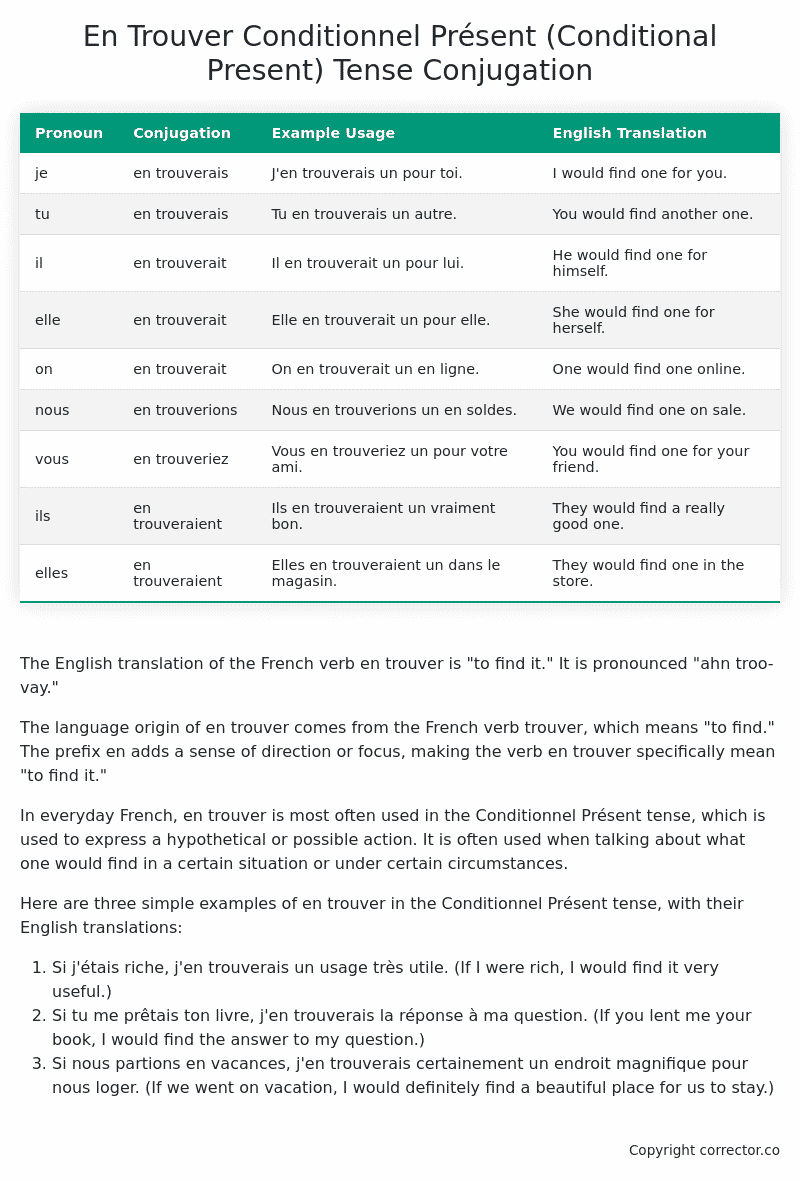Conditionnel Présent (Conditional Present) Tense Conjugation of the French Verb en trouver
Introduction to the verb en trouver
The English translation of the French verb en trouver is “to find it.” It is pronounced “ahn troo-vay.”
The language origin of en trouver comes from the French verb trouver, which means “to find.” The prefix en adds a sense of direction or focus, making the verb en trouver specifically mean “to find it.”
In everyday French, en trouver is most often used in the Conditionnel Présent tense, which is used to express a hypothetical or possible action. It is often used when talking about what one would find in a certain situation or under certain circumstances.
Here are three simple examples of en trouver in the Conditionnel Présent tense, with their English translations:
- Si j’étais riche, j’en trouverais un usage très utile. (If I were rich, I would find it very useful.)
- Si tu me prêtais ton livre, j’en trouverais la réponse à ma question. (If you lent me your book, I would find the answer to my question.)
- Si nous partions en vacances, j’en trouverais certainement un endroit magnifique pour nous loger. (If we went on vacation, I would definitely find a beautiful place for us to stay.)
Table of the Conditionnel Présent (Conditional Present) Tense Conjugation of en trouver
| Pronoun | Conjugation | Example Usage | English Translation |
|---|---|---|---|
| je | en trouverais | J’en trouverais un pour toi. | I would find one for you. |
| tu | en trouverais | Tu en trouverais un autre. | You would find another one. |
| il | en trouverait | Il en trouverait un pour lui. | He would find one for himself. |
| elle | en trouverait | Elle en trouverait un pour elle. | She would find one for herself. |
| on | en trouverait | On en trouverait un en ligne. | One would find one online. |
| nous | en trouverions | Nous en trouverions un en soldes. | We would find one on sale. |
| vous | en trouveriez | Vous en trouveriez un pour votre ami. | You would find one for your friend. |
| ils | en trouveraient | Ils en trouveraient un vraiment bon. | They would find a really good one. |
| elles | en trouveraient | Elles en trouveraient un dans le magasin. | They would find one in the store. |
Other Conjugations for En Trouver.
Le Present (Present Tense) Conjugation of the French Verb en trouver
Imparfait (Imperfect) Tense Conjugation of the French Verb en trouver
Passé Simple (Simple Past) Tense Conjugation of the French Verb en trouver
Passé Composé (Present Perfect) Tense Conjugation of the French Verb en trouver
Futur Simple (Simple Future) Tense Conjugation of the French Verb en trouver
Futur Proche (Near Future) Tense Conjugation of the French Verb en trouver
Plus-que-parfait (Pluperfect) Tense Conjugation of the French Verb en trouver
Passé Antérieur (Past Anterior) Tense Conjugation of the French Verb en trouver
Futur Antérieur (Future Anterior) Tense Conjugation of the French Verb en trouver
Subjonctif Présent (Subjunctive Present) Tense Conjugation of the French Verb en trouver
Subjonctif Passé (Subjunctive Past) Tense Conjugation of the French Verb en trouver
Subjonctif Imparfait (Subjunctive Imperfect) Tense Conjugation of the French Verb en trouver
Subjonctif Plus-que-parfait (Subjunctive Pluperfect) Tense Conjugation of the French Verb en trouver
Conditionnel Présent (Conditional Present) Tense Conjugation of the French Verb en trouver (this article)
Conditionnel Passé (Conditional Past) Tense Conjugation of the French Verb en trouver
L’impératif Présent (Imperative Present) Tense Conjugation of the French Verb en trouver
L’infinitif Présent (Infinitive Present) Tense Conjugation of the French Verb en trouver
Struggling with French verbs or the language in general? Why not use our free French Grammar Checker – no registration required!
Get a FREE Download Study Sheet of this Conjugation 🔥
Simply right click the image below, click “save image” and get your free reference for the en trouver Conditionnel Présent tense conjugation!

En Trouver – About the French Conditionnel Présent (Conditional Present) Tense
Formation
Common Everyday Usage Patterns
Expressing Polite Requests
Expressing Hypothetical Situations
Expressing Doubt or Uncertainty
Interactions with Other Tenses
Present Tense
Past Tense
Future Tense
Conditional Perfect
Summary
Want More?
I hope you enjoyed this article on the verb en trouver. Still in a learning mood? Check out another TOTALLY random French verb conjugation!


